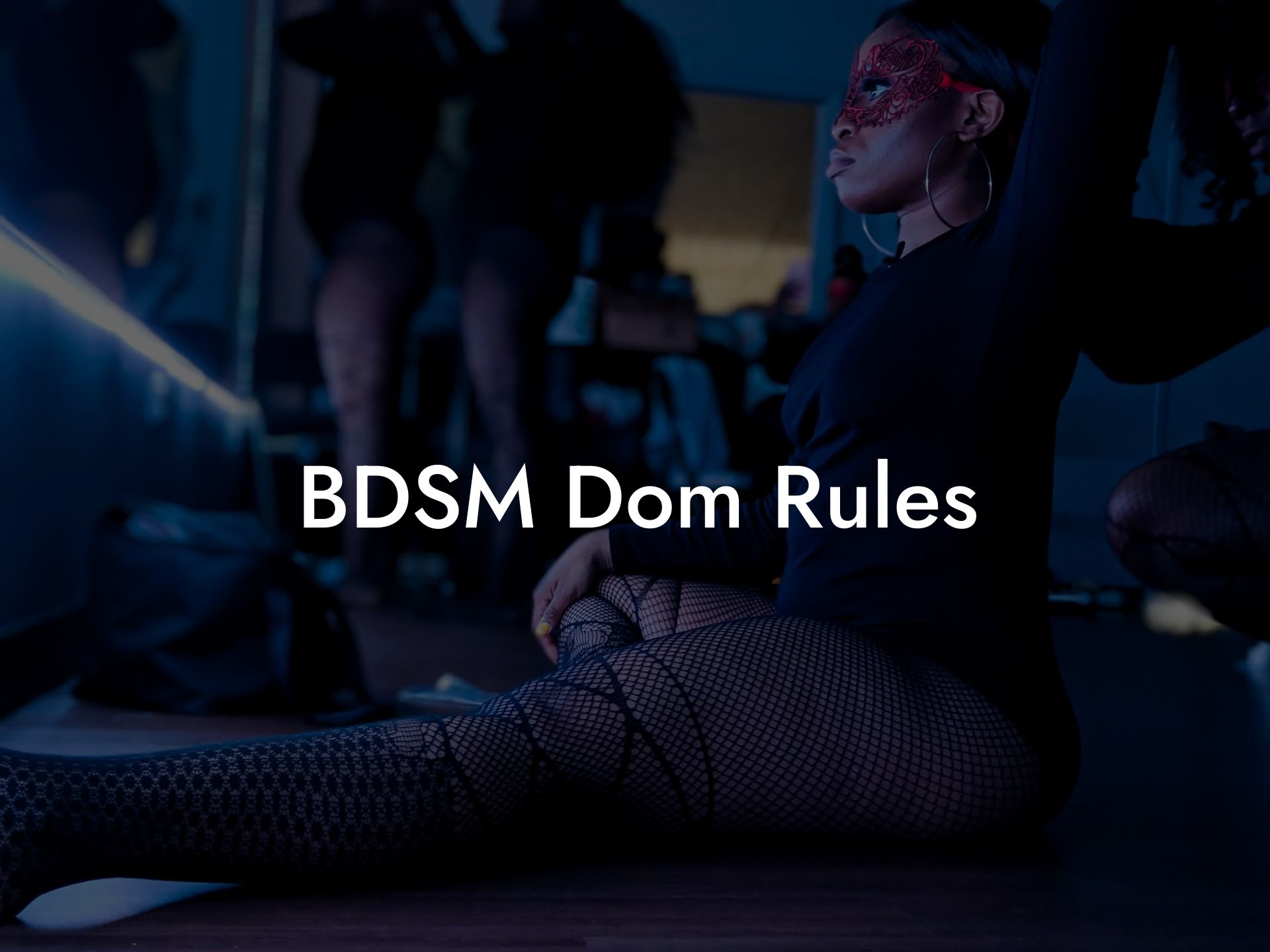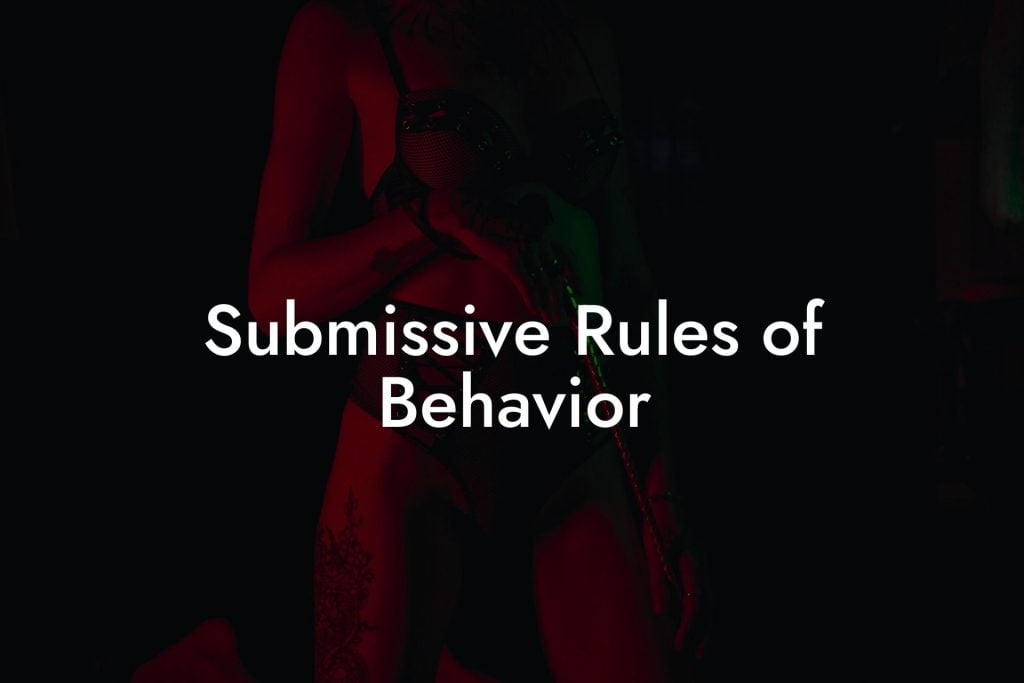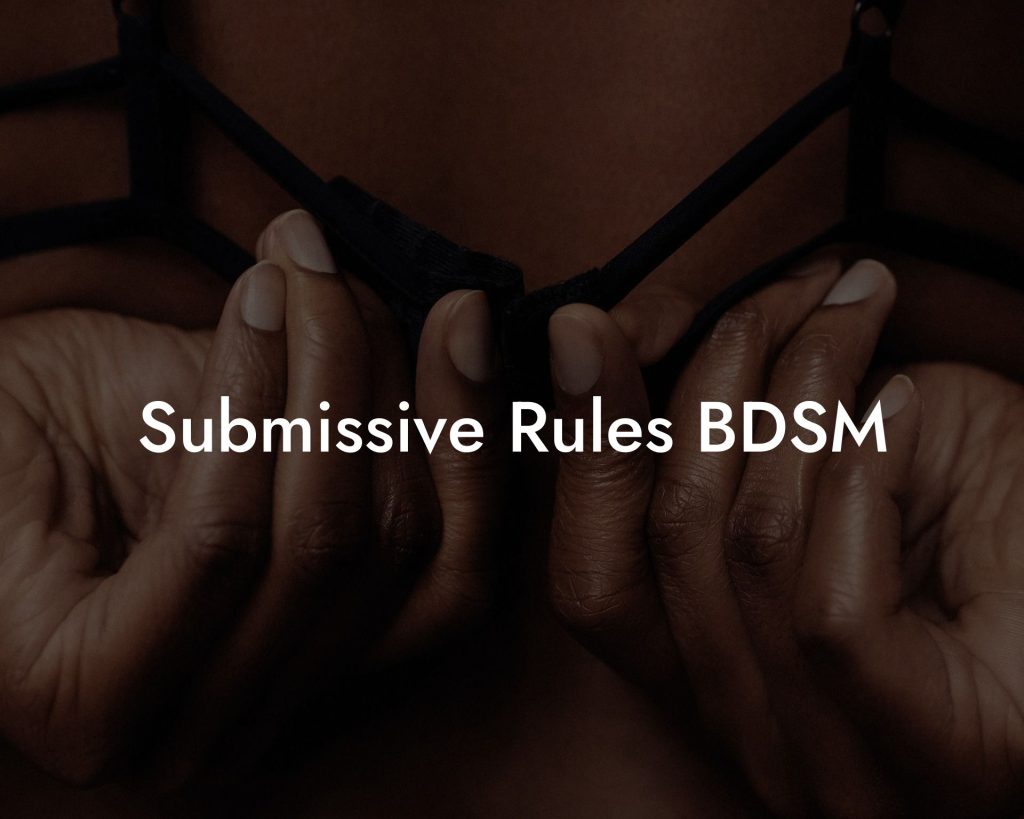Being a BDSM Dominant comes with great responsibility and requires a deep understanding of your partner's desires, boundaries, and consent. In this article, we will explore the essential rules for a BDSM Dom and provide valuable insights into maintaining a healthy and fulfilling BDSM relationship. From effective communication to creating a safe environment, let's delve into the world of dominance and submission.
In any BDSM relationship, consent is the cornerstone of trust and respect. It’s more than just saying “yes” or “no”—it’s about openly communicating your desires, limits, and expectations. But trust doesn’t end with a conversation—it’s built through ongoing, clear agreements. That’s where our Dominant & Submissive BDSM Contract Pack comes in. Find out more →
Communication
To be a successful BDSM Dom, effective communication is of utmost importance. Openly discuss your desires, limits, and expectations with your sub. Establish safe words or signals to ensure clear understanding during scenes and establish a foundation of trust and respect.
Consent
Consent is absolutely crucial in BDSM relationships, and as a Dom, it is your responsibility to obtain explicit consent before engaging in any activity. Always respect your sub's boundaries and listen to their needs to maintain a safe and consensual dynamic.
Dominance
Embrace your role as a Dom by asserting your authority and taking control. Establish rules and protocols that align with both your and your sub's desires and level of comfort. Demonstrate leadership, confidence, and firmness while still being attentive to your sub's well-being.
Safety
Safety is paramount in BDSM, and as a Dom, it falls on you to ensure the physical and emotional safety of your sub. Educate yourself about safe practices and techniques, use appropriate tools and equipment, and regularly check in with your sub during and after scenes to address any concerns or issues.
Looking for the best BDSM & Kink OnlyFans content creators? Here is a list of of our favourites that you will love:
-
- Best BDSM & Fetish OnlyFans - Molly✨ >> Link
- Best BBW & Huge Ass OnlyFans - Naughty Hanna Zimmer 💜🎀 >> Link
- Best Sexy Gaming Nerd OnlyFans - 🎮 Gracy EstuSWEET 🎮 >> Link
- Best Fetish & Kink Messaging OnlyFans - 💫Lola La Fleur 💫 >> Link
- Best Girl Next Door OnlyFans - ☀️Lily ⛅ >> Link
- Best Tiny European OnlyFans - 💝 Ami Allison 💝 >> Link
- Best Cosplay OnlyFans - 🐱 Little Kitty Kate 👉👌 >> Link
- Best Little OnlyFans - 🧸 Katya 🙇♀️ Sun >> Link
- Best Sub OnlyFans - 🍌Hanna Banana🍌 >> Link
- Best Teen & Huge Tits OnlyFans - ❣️Anny❣️19 y.o. BUSTY student girl >> Link
- Best Tiny Tits OnlyFans - ⍣⭐️ Sofia Parker ⭐️⍣ >> Link
- Best Sub & Huge Boobs OnlyFans - Nika Huge Boobs >> Link
- Best Kink OnlyFans - Sofia💖 >> Link
- Best Fetish & Girl Next Door OnlyFans - Hillary is Wet 💦 >> Link
- Best Dirty Latina OnlyFans - Paula Flores 😈 >> Link
Not quite what you are looking for? View the full list →
Trust and Respect
Building trust and respect is essential for a healthy BDSM relationship. Show appreciation for your sub's submission and dedication, and provide aftercare to support their emotional needs. Be consistent, reliable, and maintain confidentiality to reinforce the trust between you and your sub.
Frequently Asked Questions
What is a BDSM contract?
A BDSM contract is a written agreement between two or more parties involved in a BDSM relationship that outlines the dynamic, rules, limits, and expectations of the interaction. While not legally binding, it serves as a deep communication tool that sets the foundation for trust and consent in the relationship.
Why are BDSM contracts important?
BDSM contracts are important because they ensure that all parties involved have a clear understanding of boundaries and consent. They foster open communication about desires, limitations, and expectations, which helps to prevent misunderstandings and reinforces safety within the dynamic.
Do all BDSM relationships require a contract?
Not all BDSM relationships require a contract; it is a personal choice for the individuals involved. Some may find that verbal agreements suffice, while others prefer the formality and clarity that a written contract provides.
How do power dynamics work in a BDSM relationship?
Power dynamics in BDSM involve an exchange of control where one person (the Dominant) takes on a more controlling role, while the other person (the Submissive) agrees to relinquish some level of control. These roles are consensual, and the depth and specifics of the power exchange are unique to each relationship.
How is consent obtained and maintained in a BDSM context?
Consent in BDSM is obtained through open and honest communication before any activities begin. It is an ongoing process where all parties must actively agree and reaffirm their consent to activities, and it can be withdrawn at any time. Safe words or signals are often used to maintain clear lines of communication.
What is a "safe word," and how is it used?
A safe word is a pre-agreed upon word or signal that participants in a BDSM scene can use to communicate boundaries or stop the activity immediately. It is a critical safety measure to ensure all parties feel secure and respected.
Do BDSM activities always involve physical pain or restraints?
No, BDSM activities do not always involve pain or restraints. The spectrum of BDSM is wide and can include power play, role-playing, sensory deprivation, psychological play, and more, with varying levels of intensity. It's about the consensual exchange of power and control, and not necessarily about pain.
Can you modify a BDSM contract?
Yes, a BDSM contract can and often should be modified as the relationship evolves or as individuals learn more about their boundaries and desires. Regular reviews of the contract are encouraged.
What measures can be taken to ensure safety during a BDSM session?
Measures to ensure safety during BDSM include educating oneself about the practices, using safe words, setting clear boundaries, having safety equipment on hand (such as scissors for rope play), and maintaining good communication throughout the session.
Is it possible to revoke consent during a BDSM scene?
Absolutely. Consent can be revoked at any time during a BDSM scene. Once consent is withdrawn, all activities should stop immediately, and the parties should discuss what has triggered the revocation of consent.
What is aftercare, and why is it important in BDSM?
Aftercare is the practice of attending to one another's physical and emotional needs after a BDSM scene. It's important because it helps partners to reconnect, restores emotional equilibrium, and attends to any potential physical soreness or emotional vulnerability arising from the session.
Can someone be a Dominant or a Submissive outside of the bedroom?
Yes, the roles of Dominant and Submissive can extend beyond the bedroom and into daily life, often referred to as 24/7 D/s relationships. The extent to which these roles are incorporated into daily life is a personal decision negotiated by the parties involved.
Is there a “right” way to practice BDSM?
There is no universally "right" way to practice BDSM. The "right" way is one that involves informed consent, mutual respect, and consideration for the safety and well-being of all parties involved. Practices should align with the desires and limits of the participants.
How do I talk to my partner about wanting to try BDSM?
Talking to your partner about trying BDSM should start with honest communication. Express your interests and desires clearly and listen to their thoughts and boundaries. Educate yourselves together about safe practices and start slowly with clear consent.
What should you do if something goes wrong during a BDSM activity?
If something goes wrong during a BDSM activity, stop the activity immediately. Address any injuries or emotional distress immediately. Communicate openly about what went wrong and learn from the experience to prevent a recurrence.
How can beginners educate themselves about BDSM safely?
Beginners can educate themselves about BDSM safely by reading reputable sources, attending workshops or seminars, seeking communities or experienced individuals who practice BDSM, and maintaining an open dialogue with partners about boundaries and expectations.
Are BDSM practices legal?
BDSM practices are legal as long as all activities are between consenting adults and respect the laws of the jurisdiction in which they take place. It's important to stay informed about the local laws pertaining to consent and sexual practices.
What are some common misconceptions about BDSM?
Common misconceptions about BDSM include the idea that it is only about pain, that it is abusive, or that those who engage in it have psychological issues. BDSM, when practiced consensually and safely, is a legitimate form of sexual expression and relationship dynamics.
How do you negotiate a scene or arrangement in BDSM?
Negotiating a scene or arrangement in BDSM involves discussing and agreeing on various aspects like roles, activities, limits, safe words, and aftercare before engaging in the scene. It's a collaborative process aimed at ensuring a fulfilling experience for all involved.
Can BDSM elements enhance a relationship?
BDSM elements can enhance a relationship by introducing new levels of intimacy, communication, trust, and personal exploration. However, like any sexual practice, it should be approachable with mutual consent and comfort levels in mind.













